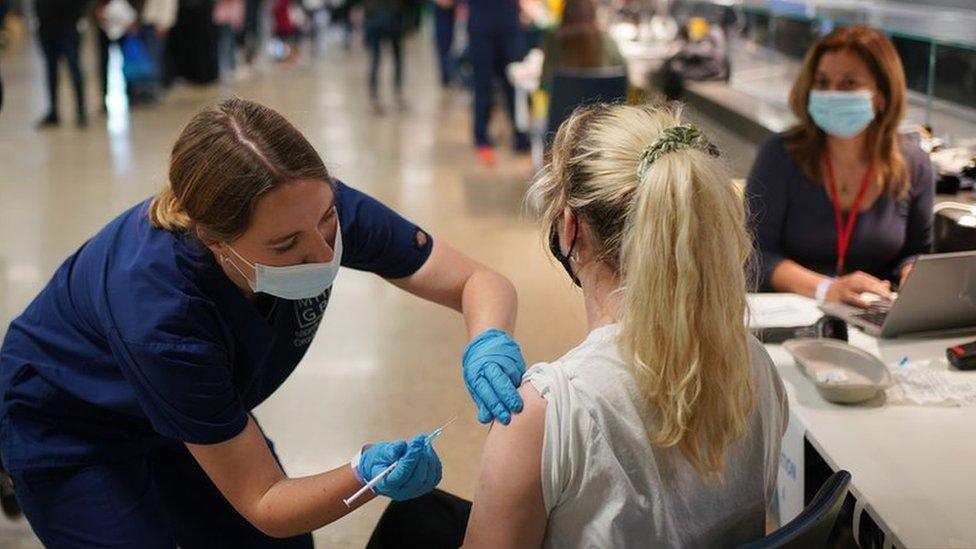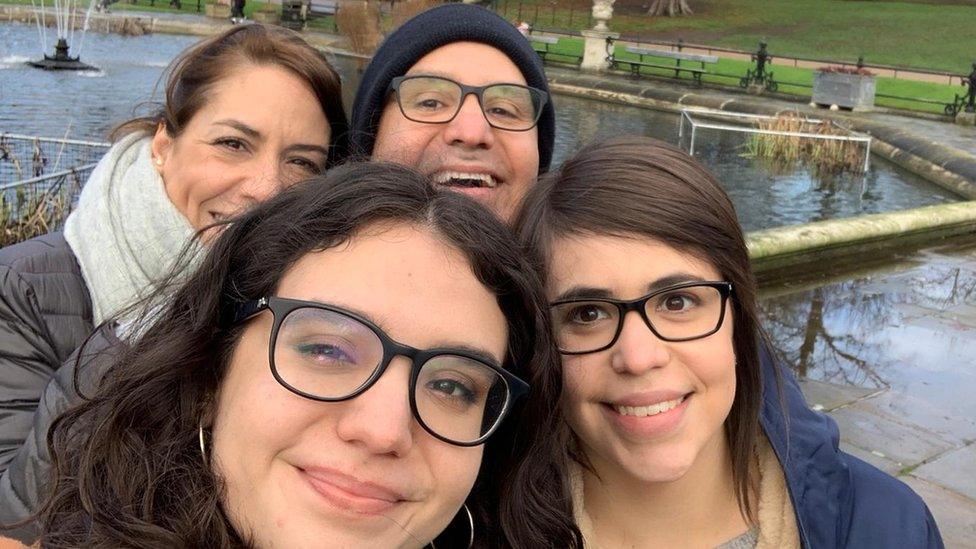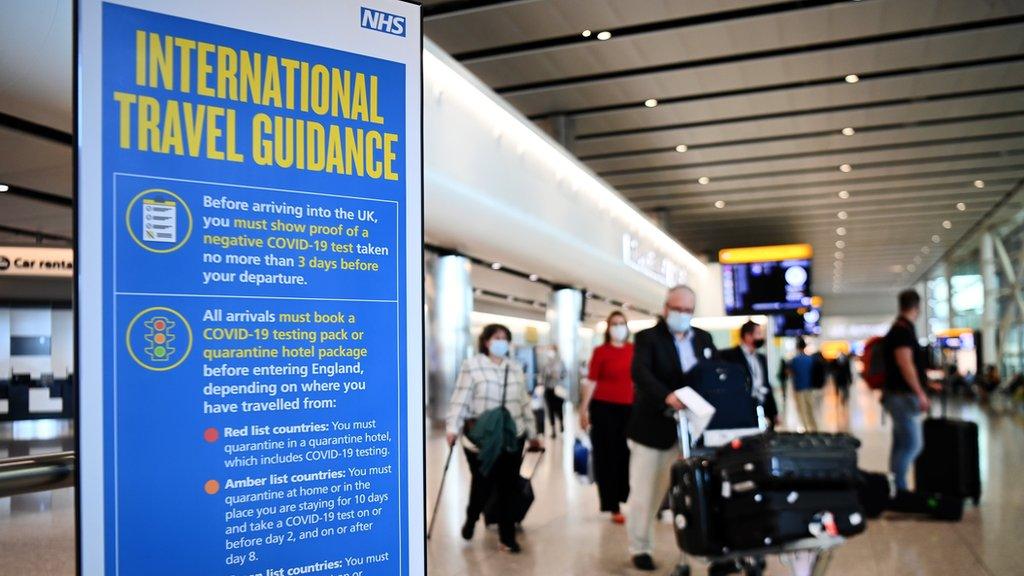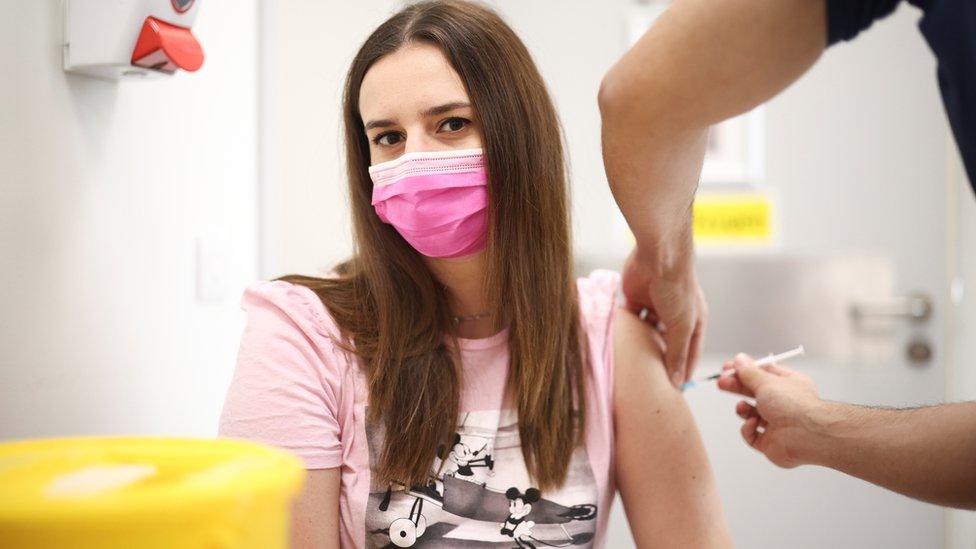Covid booster vaccine plan to come in a few weeks - Matt Hancock
- Published
- comments
Covid booster jabs planned for autumn, says Health Secretary Matt Hancock
Plans for a Covid booster jab programme in the autumn will be set out in the next few weeks, Matt Hancock has said.
The health secretary said ministers were waiting for results from trials of different combinations of vaccines.
It comes after doctors and NHS trusts said planning for a booster rollout must start now as it will involve bigger challenges.
They said many questions needed answering, including how long immunity from the original Covid jab lasts.
The issue of whether children will be vaccinated also still remains, health leaders said.
"We are currently trialling which combinations of jabs are the most effective," Mr Hancock told BBC Breakfast.
"In the next few weeks, when we get the clinical data through on what's the most effective combinations to have… then we'll set out all the details for the booster programme for the autumn."
Among the ongoing trials is the UK's Cov-Boost trial, external, which is testing different combinations of third doses.
A senior government source said the UK would also benefit from new vaccines from Novavax and Valneva, which are awaiting approval from the UK's medicines regulator.
So far, nearly 60% of UK adults have had two jabs of the vaccine, meaning they are fully vaccinated, and more than four in five adults have had their first dose.
People have been rushing to get their vaccines in recent days, with more than one million jabs booked on Friday and Saturday in England after vaccinations opened to all over-18s.

Rosi Stamp, 25, was one of those who received their Pfizer jab at Tottenham Hotspur's stadium on Sunday
Ministers have repeatedly said that vaccination is the way out of lockdown, and the delay to England's lockdown ending from 21 June until 19 July was partly to allow more people to get vaccinated.
Some restrictions have been eased on Monday though, the original date for lockdown ending - and what some had dubbed Freedom Day.
The number of guests at a wedding is no longer limited to 30 (although there are capacity rules depending on a venue's size), visiting arrangements for care homes are changing, children can go on overnight trips in groups of 30, and pilots of large events like Euro 2020 games will continue.
And in Wales, rules are also being lifted slightly, including Covid capacity restrictions for music and comedy and the limits on weddings changing in line with a venue's size.
In Northern Ireland, a planned easing of restrictions has been pushed back to at least 5 July, and current rules in Scotland are expected to be extended until mid-July.
The average number of daily confirmed cases of coronavirus is now rising in the UK, with a further 9,284 announced by the government on Sunday., external A further six deaths were announced.

LOOK-UP TOOL: How many cases in your area?
LOCKDOWN RULES: What are they and when will they end?
SOCIAL DISTANCING: How can I meet my friend safely?

On Monday, Chris Hopson, the head of NHS Providers, which represents NHS hospitals and trusts in England, and Royal College of GPs chairman Martin Marshall said the 19 July target to offer a first dose to all adults was "not so much a finishing line as a staging post".
The government has previously promised there will be a booster programme for the Covid jab - but the health leaders said the prospect of a yearly Covid vaccine would bring "arguably greater challenges", and it was important to know:
How long will protection from the original double doses last - and will boosters be needed?
Will people get the same vaccine as the original one they got?
How will tweaking the vaccines for new variants work?
Will Covid vaccines be tweaked every year, like the flu vaccine, or will it be more frequently?
Will children be vaccinated and if so, when, where and how, because of the need to get consent?
Margaret Keenan, 91, talks to the BBC about becoming the first person in the world to get the Pfizer-BioNTech jab last December
They also said combining the Covid and flu vaccine rollouts - for example a Covid jab in one arm and a flu jab in the other - needed to be explored, but that would make the rollout more complex.
And they said there needed to be investment in proper vaccination venues rather than relying on sports stadiums or community facilities.
"Since flu jabs start in September we need ministers and the JCVI - the Joint Committee on Vaccination and Immunisation - to really answer those questions as quickly as possible, so we're ready to administer the jabs we need to in the autumn," Mr Hopson told the BBC.
Mr Hopson and Mr Marshall said there needed to be a sustainable approach to vaccination, which meant the NHS could carry on vaccinating while also doing its other work.
"We cannot just carry on as we are, with an emergency response largely delivered by an overstretched workforce," they said.


They are asking questions rather than coming up with solutions but health leaders have identified a major challenge for the coming winter.
Offering a first dose to all adults by 19 July is seen as just a first step in a long haul with Covid.
Given that booster vaccines will be needed, GPs and NHS trusts want to know the logistics of what will be a complex process on top of the usual winter pressures and dealing with the backlog of non-urgent work.
Doctors and their practice teams have gone the extra mile to help deliver the Covid vaccination programme but they want to ensure day-to-day patient care is not compromised.
The flu season might seem some way off but the normal vaccination campaigns and rollout start in September each year.
Hence the call for ministers to come with some answers and longer term plans soon.

Prof Anthony Harnden, deputy chairman of the JCVI, which advises UK health departments on vaccination, said decisions on booster jabs would be "based on the best available evidence" but the committee was also conscious of the need for the programme to be planned by the NHS.
He told BBC Radio 4's Today programme data on how flu and Covid vaccines could react to each other if given together would be available "very soon".
Prof Harnden added that flu could be "potentially a bigger problem" than Covid this winter because of the low prevalence in the last few years, particularly during lockdown, meaning the level of immunity in the population had dropped.
On whether under-18s could be offered a Covid vaccine, he said "we need to think very carefully what the benefits are to children themselves", and the JCVI would be considering this in the next few weeks.
The committee has not yet made a formal recommendation on the matter.
The World Health Organization has previously urged rich countries like the UK to donate doses to poorer countries before organising booster jabs.

POSE: The ground-breaking drama shining a light on 1980s New York ball culture
"I WAS JUST FALLING FURTHER AND FURTHER BEHIND": Heartfelt stories from people across the UK who struggle to read and write

- Published2 April

- Published16 June 2021

- Published16 June 2021

- Published17 November 2021

- Published5 July 2023
